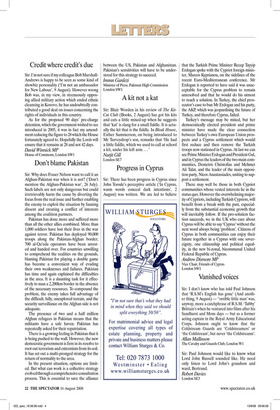Don’t blame Pakistan
Sir: Why does Fraser Nelson want to call it an Afghan-Pakistan war when it is not? (‘Don’t mention the Afghan-Pakistan war’, 26 July). Such labels are not only dangerous but could irretrievably harm the cause by diverting the focus from the real issue and further enabling the enemy to exploit the situation by fanning dissent and creating a conflict of interests among the coalition partners.
Pakistan has done more and suffered more than all the other allies combined. More than 1,000 soldiers have lost their lives in the war against terror. Pakistan has deployed 90,000 troops along the Pakistan-Afghan border; 700 al-Qa’eda operators have been arrested and handed over. For countries unwilling to comprehend the realities on the grounds, blaming Pakistan for playing a double game has become a convenient way of evading their own weaknesses and failures. Pakistan has time and again explained the difficulties in the area. It is a daunting task for it effectively to man a 2,200km border in the absence of the necessary resources. To compound the problem, the enemy takes full advantage of the difficult, hilly, unexplored terrain, and the security surveillance on the Afghan side is not adequate.
The presence of two and a half million Afghan refugees in Pakistan means that the militants have a safe haven. Pakistan has repeatedly asked for their repatriation.
There is a growing feeling in Pakistan that it is being pushed to the wall. However, the new democratic government is firm in its resolve to root out terrorism and extremism from its soil. It has set out a multi-pronged strategy for the return of normality to the area.
In the present situation, options are limited. But what can work is a collective strategy evolved through a comprehensive consultation process. This is essential to save the alliance between the US, Pakistan and Afghanistan. Pakistan’s sensitivities will have to be understood for this strategy to succeed.
Imran Gardezi
Minister of Press, Pakistan High Commission London SW1


























































 Previous page
Previous page